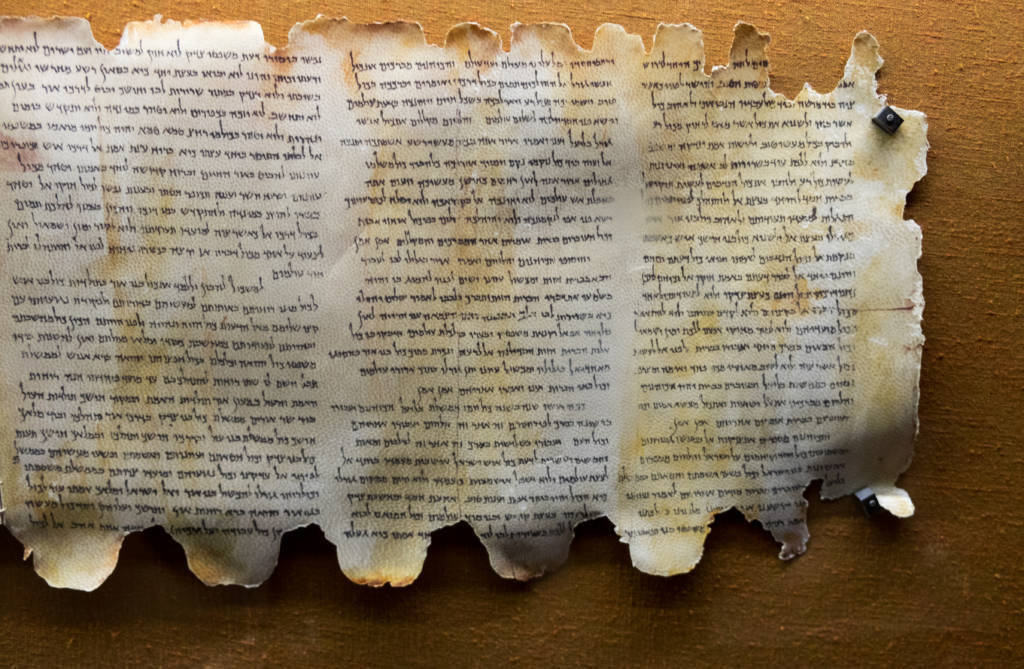A scientific investigation funded by the Museum of the Bible confirmed that all 16 fragments of the Dead Sea Scrolls on display at a Washington, D.C. museum are forgeries.
By United with Israel Staff
Art fraud investigator Colette Loll and her team discovered that all 16 Dead Sea Scroll fragments on display at the Museum of the Bible in Washington, D.C., including parts from the Book of Genesis, are forgeries, National Geographic reported. The investigators issued a 200-page report after a two-day conference at the museum on their findings was cancelled due to coronavirus restrictions.
Steve Green, a primary donor to the museum, paid millions of dollars from his family fortune for the fragments believing they would be an important addition to the museum, which opened in 2017. Following the expose, the fragments are now worthless.
Green jumped on the “opportunity” to own some of the oldest biblical texts known to exist and purchased the artifacts between 2009 to 2014.
The investigators were hired to study the fragments following revelations in 2017 that many Dead Sea Scroll pieces were forgeries. Their analyses took over six months.
In addition to duping the museum’s founder, the high-quality forgeries fooled outside collectors and some of the world’s leading biblical scholars.
“The Museum of the Bible is trying to be as transparent as possible,” Harry Hargrave, CEO of the museum said, according to National Geographic. “We’re victims—we’re victims of misrepresentation, we’re victims of fraud.”
The authenticity of the Dead Sea Scrolls on display in Jerusalem’s Shrine of the Book facility at the Israel Museum is not in question. These scrolls contain original Hebrew bible dating from about 400 BCE to 300 AD. They were first discovered in 1947 in clay pots in the Qumran caves near the Dead Sea. Thousands of parchment scrolls were found throughout a nine-year period.
In contrast, the museum’s forgeries were produced through a complex system that included various chemicals and a poor attempt to recreate the handwriting of ancient Hebrew scribes. According to the report, it is believed that the parchment used was from Roman-era leather, possibly from boots or sandals.
They are believed to have stemmed from a Bethlehem-based antiquities dealer named Khalil Iskander Shahin, otherwise known as Kando. He acquired many fragments from local Bedouins and sold them to collectors around the world in the 1950s.
Though in the 1970s UNESCO and a new Israeli law restricted the sale of looted scrolls, in the early 2000s antiquities dealers and biblical scholars started selling even tiny pieces of shriveled fragments, claiming they were traced back to Kandos.
Seven of the 16 forged museum pieces were purchased directly from William Kando, the elder Kando’s son, reported National Geographic.
“After an exhaustive review of all the imaging and scientific analysis results, it is evident that none of the textual fragments in [the] Museum of the Bible’s Dead Sea Scroll collection are authentic,” Loll, founder and director of Art Fraud Insights, reported. “Moreover, each exhibit’s characteristics suggest they are deliberate forgeries created in the 20th century with the intent to mimic authentic Dead Sea Scroll fragments.”
The museum will remove the fake scroll that were part of a permanent exhibit while it remains closed during the coronavirus crisis.
Do You Love Israel? Make a Donation - Show Your Support!
Donate to vital charities that help protect Israeli citizens and inspire millions around the world to support Israel too!
Now more than ever, Israel needs your help to fight and win the war -- including on the battlefield of public opinion.
Antisemitism, anti-Israel bias and boycotts are out of control. Israel's enemies are inciting terror and violence against innocent Israelis and Jews around the world. Help us fight back!
